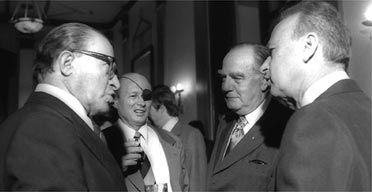
Even if you have no Spanish, you'll identify the figure of Adolf Hitler in it, and you'll realize it purports to depict a concentration camp.
If you do have Spanish you'll agree that it isn't funny at all (partial translation in the blockquote that follows), and it plays on the suffering of concentration camp inmates, which expectedly will anger and offend Holocaust survivors.
Now is it antisemitic? Here's what the B'nai B'rith had to say about it:
B'nai B'rith Strongly Condemns Anti-Semitic Cartoon in Argentine Paper: Comic Strip Portrays Dance Party at Concentration Camp, Hitler Appearance
B’nai B’rith International condemns in the strongest terms possible an anti-Semitic cartoon strip, “FieSSta,” (the capitalized “SS” referring to the Nazis) by Gustavo Sala published in the Argentine paper Página 12 and calls on the country’s government to denounce the daily newspaper under the country’s anti-discrimination law.
The cartoon strip’s main character, DJ David Gueto (a caricature of the French DJ David Ghetta) plays music in a concentration camp. At first, the prisoners don’t want to dance because they feel there’s nothing to celebrate, saying: “do you know that they kill us in gas chambers and make soap with us?” Hitler then appears and convinces them to dance because “life is short.” Hitler then thanks the DJ, saying: “If they are relaxed, the soap will be better.”
B’nai B’rith expresses its deep outrage and revulsion toward this cartoon, its creator and the newspaper that chose to publish it.(...)
“This cartoon strip is beyond offensive—it is frightening. It epitomizes the blatant, ongoing anti-Semitism that still exists, in 2012, throughout the world,” said B’nai B’rith International Executive Vice President Daniel S. Mariaschin.
Now I would say there's a very objectionable point about this comic strip: it repeats the canard that the Nazis made soap from their victims. This is an insult to German rationality, since making soap from corpses made no sense and would have been a waste of resources. While many Jews have disseminated the canard, historians (Jewish or not) have discarded it. Other than that, the strip correctly claims that the inmates were exterminated and that gas chambers were used to that effect. So where's the antisemitism? Is the Holocaust denied? Are the Jews stereotyped? No and no. Are the Jews ridiculed?
One might say yes, but actually we don't know who the prisoners are. They are not shown with a Star of David stitched to their shirts. The B'nai B'rith is indulging in a racism of its own by taking it for granted that the inmates in the strip are Jewish, thus forgetting that Gypsies and Soviet prisoners were also sent to the gas chambers. But let's suppose that the strip's author had Jews in mind. Yes it is offensive. Yes it is making fun of victims of genocide. But no stereotypes are used, and that is the smoking gun absent which talk of antisemitism is unreasonable.
Not content with calling antisemitism what really isn't, the B'nai B'rith proceeds to give its advice to the Argentinian government:
“We hope the Argentine government swiftly and strongly utilizes its anti-discrimination law to take the appropriate route to quell this and any further anti-Semitic behavior,” said B’nai B’rith International President Allan J. Jacobs.
There does exist an anti-discrimination law in Argentina, but it doesn't cover this case. Let's see the relevant articles:
Article 1: Any person who arbitrarily prevents, obstructs, restricts or in any way diminishes the full exercise on an egalitarian basis of the fundamental rights and guaranties recognized in the Constitution will be obliged, at the damaged person’s request, to suspend the effects of the discriminatory action or stop performing it, and to repair the moral and material damage caused. To the effect of the present article discriminatory actions or omissions determined by such motives as race, religion, nationality, ideology, political or trade-unional opinion, gender, economic position, social condition or physical characteristics will be particularly considered.
Article 3: A prison term of 1 month to 3 years will be imposed on those who participate in an organization or disseminate propaganda based on ideas or theories of superiority of a race or group of people of a certain religion, ethnic origin or color, which are aimed at justifying or promoting racial or religious discrimination in any form. The same punishment will be meted on those who by any means encourage or incite to persecution or hate against a person of group of people because of their race, religion, nationality or political ideas.
Clearly, neither article says anything about callously mocking someone else's suffering, even if a specific group is singled out for ridicule.
So that the B'nai B'rith is not actually demanding for the law to be enforced; it's asking for censorship (disguised as anti-discrimination) to be used against things that they (or I, for that matter) don't like. The government, naturally, won't take the advice, and the myth of an antisemitic Argentina (Argentina, where the foreign minister is Jewish) will make the rounds of the Jewish press once again, maybe persuading 10 or 12 young Jews to emigrate to Israel. Which is very convenient for the cause of Zionism, even if absoloutely inconvenient for the causes of truth and intellectual honesty.
